Ahoy, squirts! Quint here with a little interview I did with a young filmmaker named David Yarovesky. I saw his film, The Hive, at Fantastic Fest last year and dug it a lot (proof: my review!) and now that little creepy story of a young man who wakes up barricaded into a filthy, disgusting bloody room with a bunch of random messages scrawled on the walls with no memory of how he came to be in that room is heading to screens all over the country this coming Monday thanks to a new distribution platform that brings Nerdist and Fathom Events together.
That's right, it's a one night thing (this upcoming Monday, September 14th) but it's all over the country instead of the typical “New York and LA only” limited released indie flicks tend to get these days. See if it's playing near you and pick up some tickets!
Yarovesky, or Yarvo to his intimates, and I talk a lot about mounting an indie film, his music video background and the rather unique distribution model they're trying out. There aren't many spoilers about the movie, so don't worry about ruining your movie-going experience. Instead, read along with Yarvo's story about bringing this fucked up little piece of genre sweetness to life.
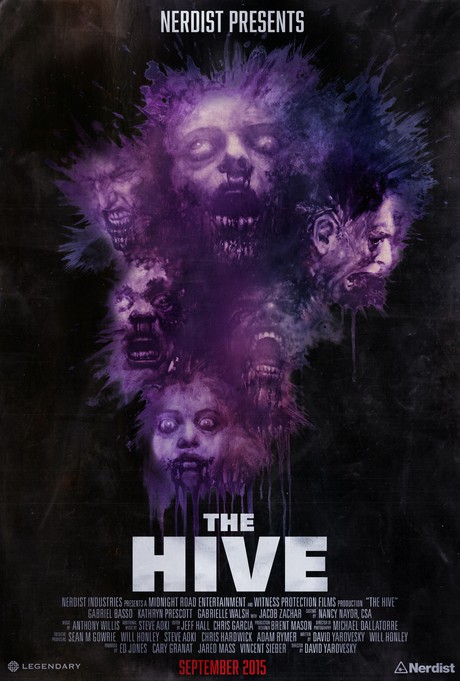
Quint: We should start by talking about the kind of assholes and elbow grease indie filmmaking spirit you approached The Hive with. You did this old school indie film style, right? You didn't have a Jason Blum sitting on your shoulder, peeling off some cash.
David Yarovesky: (laughs) No, we definitely didn't. Look, I'm really fortunate in that I have a huge body of work. I've done about 50 music videos at this point and in that time I've developed a crew and earned a lot of favors I was able to cash in for The Hive. If I was just some new kid off the street just asking people to work for me for pennies and high fives... it wouldn't have gone.
I was really lucky in that I have a core crew; my DP, wardrobe, production designer and some other key figures. I got to work with them and they really elevated the project.
Look, we didn't even have the budgets that indie horror has these days, like The Babadook or It Follows. We were a fraction of those budgets, so I feel very fortunate to be put in the spotlight on this level.
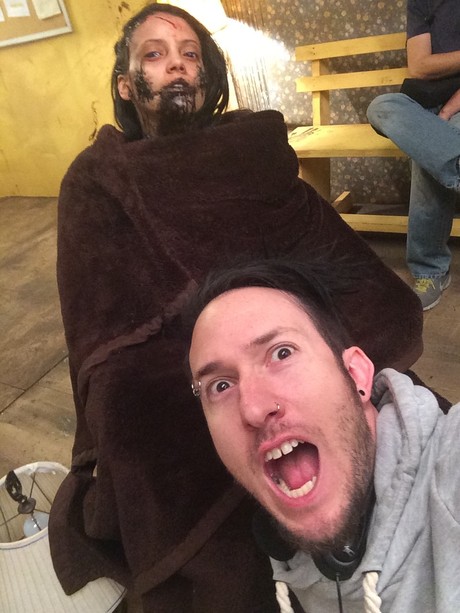
Quint: When you started with music videos, did you always have an eye on directing features? Was that the ultimate goal?
David Yarovesky: Yeah, I always wanted to make movies. That's what it's always been about for me. The first time I tried to make a movie and it didn't happen was in 2004. There's always been these movies I've been trying to get going. In the meantime in order to make a living and to teach myself the craft, play with the tools and learn the process of making things I've been doing video after video. It ended up developing that way, but yeah, it's always been about films from moment one.
I love music videos, I love the ADD artform of it where I have an idea and two weeks later I'm shooting it and two weeks later I'm turning it in and it's on YouTube two weeks after that. I love it, it's fun, but it doesn't warm my heart in the way making this movie did.
Quint: So you felt in your element when you showed up on Day One of The Hive? Or were you terrified?
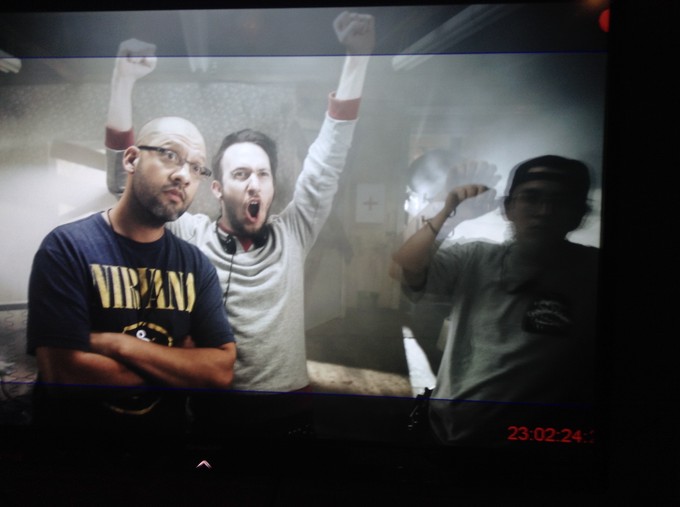
David Yarovesky: I was less terrified than you'd expect. You know, I was a little concerned just because of the practical situation on the ground. As you get closer to shooting you start to see how many days you have, how tight things are going to be. Every single day you've got a big gag and we have 12 pages to get through on top of all that, so you're like, “Shit, we gotta go!” But at the same time I feel really comfortable in it because of my past and the people that I worked with. I knew we could do it. We were grinding really hard, doing 50 to 60 set ups with two cameras every day and we were really happy with the way things looked.
As a person I feel uncomfortable and off-kilter 90% of my life. The time I feel the most comfortable, the most me, the most fulfilled is when I'm on set filming. I really do feel at my best and in my element behind the camera. The other times when I'm hanging out doing human things I feel... less human. (laughs)
Quint: Well, that's just because you've chased all your real friends away by being such a brutal dick when playing Munchkin.
David Yarovesky: I'm just slashing throats. Yes, that could be true... I could just be an asshole to play games with. (laughs) But I think it's more that, and I only know this from meeting other people, but I think it's rare in life that people are so focused and honed in on what they want to do with their lives. I got that at a very young age and I just never stopped. For me, every opportunity I get to do that I feel fulfilled, like I've accomplished a very long task that I set out to do.
For someone like me that feels like a wedding or a child. To see something that envisioned and thought about and dreamed of my whole life and then to see myself doing it and feeling really comfortable at it... it's just fulfilling.
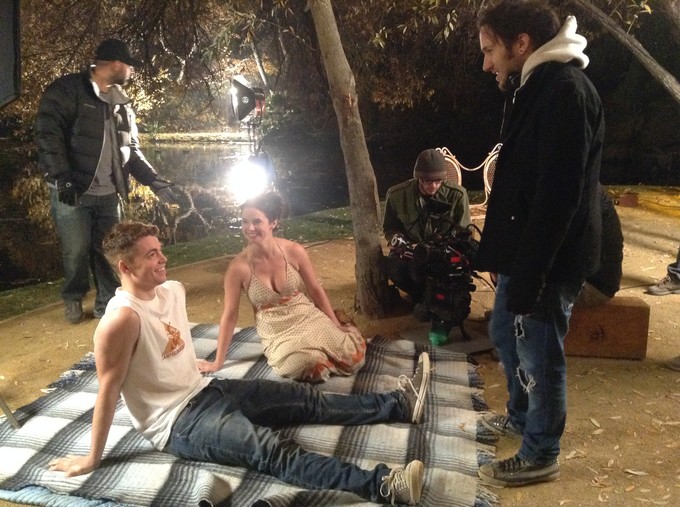
Quint: You mentioned you had a feature that didn't happen. Does that push you on the next one more or does it make you question yourself, like you're putting in a lot of time and effort into something that'll ultimately go nowhere again?
David Yarovesky: It's always frightening. You only have so many hours in your life and you want to spend them on things that will be beneficial, but you can't proceed with fear. You have move forward with confidence.
The truth is that as close as it felt, that film in 2004 was never going to happen and even if it did it wouldn't have been a good situation, so ultimately that was a good thing. I learned so many lessons there and again and again with all these films I was writing and developing... it ultimately put me in a place where I could have a fantastic relationship with my producers, that they could get behind a vision and feel confident in someone who had a grasp on what they were trying to create. Twenty-four year old me was cockier and he said bold things, but I think me today is more capable of actually accomplishing those things.
Quint: I'm sure you're like a lot of writers and you have three or four or more ideas floating around at once. Was there something about The Hive particular that hooked you and made you focus on it?
David Yarovesky: That's exactly what happened. I was developing a bunch of different movies. I didn't know which one was going to go and I got a call from a friend of mine who said, “Hey, we have this film we want you to look at.” I read the script and it was a great script, but it wasn't something I was interested in making.
I talked to my manager about it and he said, “You're not going to like anything. You're really particular, which is a good thing, so just go back and tell them what you would do.” I said, “Okay, sure.”
So, I went back to them and I said, “Guys, I think it's a cool script and there's a director out there who would want to make this movie, but if you guys want to make a movie with me this is what I would do.” I went ahead and I pitched them the movie I'm currently promoting right now. “It's this crazy puzzlebox of a thing and it's way psychological and it's trippy because this dude has memories that make no sense. He has a memory for this and a memory of this and it all starts coming together as this bigger world and then the horror starts...”
I started the pitch by saying “You're never going to go for this, but I'll tell you where I'm at and what I would do. Do with it what you will.” By the end of my pitch they were saying, “That sounds really cool. Let's do that.” I left there so excited. I couldn't believe they would let me do that! I've always been so afraid that my hands were always going to be tied and I would be forced to do something more conventional.
I made myself a promise that I would err on the side of ambition in everything about this movie. If people don't like it, they're not going to like it because it was too ambitious, not because it was too conventional.
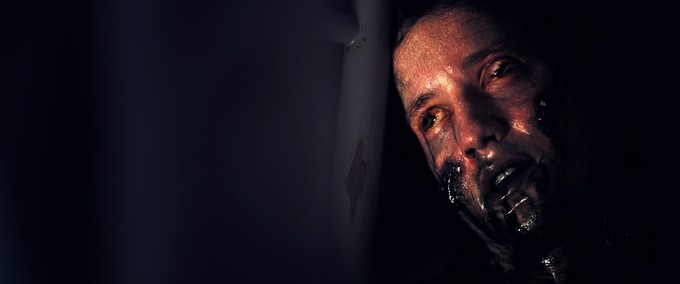
I wrote 11 drafts from the time that I started to the time we were shooting. I'm really meticulous and wanted it to be the best it could be in the time I had. It was maybe 4 months from the time they said “Sure, let's do it” to when we were filming, so I was just grinding drafts out.
And I really had a clear vision for the film. It was strange. It was the first time I ever wrote a movie, especially one that's so complicated... You've seen it, you know all the moving parts. The truth is the first draft, even though I wrote 10 more drafts, isn't structurally that much different than the first draft I wrote. It was all there. I was thinking about it for a while, putting the pieces together, and I sat down and in two hours I wrote out this document, figuring out the story. All those beats are there still, in that order.
It was crazy, I just saw everything. In one moment I saw the entire universe, saw all the pieces and how they fit together. I just wrote it down and made that movie.
Quint: You have a great hook. The movie starts right in the middle of something crazy and the rest of the movie is trying to figure out what happened. It's a testament to your work that you can pull that off. A lot of indie films, especially in the wake of Pulp Fiction's non-linear narrative, have tried that and failed. You said the structure didn't change much. Did you ever second guess yourself on how quickly you were answering the questions posed in the first few minutes?
David Yarovesky: I was always very aware of that and one of the things I kept rewriting was that opening scene. The whole movie is a game of set-up and pay-off. In the first scene there's something that is set-up that gets paid off later and it's something you won't even realize until you've seen the movie three or four times. “Oh, that object is there because this happens later.”
That first scene when he's looking around is just setting everything up. We were painstakingly meticulous. The script supervisor put himself through hell on this movie because we were tracking so many objects, items and clues throughout the entire film.
I planned the making of the movie around that. I actually made us take a break in the middle of filming. We did half the shooting, which was all the exteriors and everything outside that room, and then two weeks break and then we were inside. That way I could shoot like crazy and we could do a really quick cut of the movie, the crappiest version, but cut it together and make sure we were on path and didn't miss anything and if we did we could cover our ass later when were in that room. I built a safety net into the production of that movie because it was so important to me that all these things paid off.
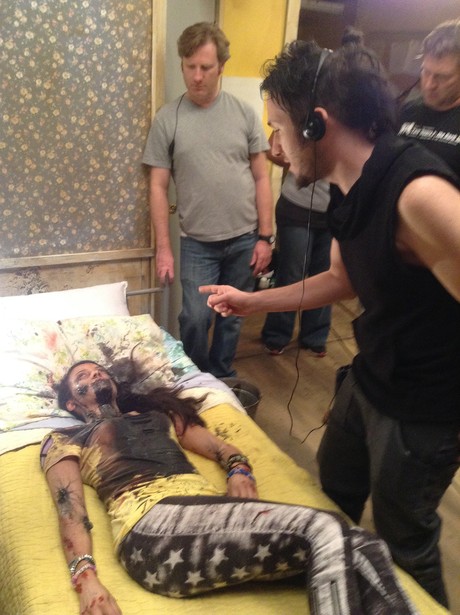
Quint: We should talk a little bit about the Nerdist release. It's an interesting model they're doing, teaming with Fathom Events to do a wide, but focused screening. It's one night, but you're in a lot of theaters. The way most indie genre is handled now is a very limited theatrical showing, mostly just New York and Los Angeles, and a simultaneous VOD release. And that's if they're lucky. Sometimes the best case scenario is just being thrown onto Netflix. So, how did the deal with Nerdist come about and was Fathom distribution appealing to you?
David Yarovesky: The truth is we showed the movie at Fantastic Fest and I was approached as I was leaving the theater by the people at Nerdist. They were like “I think this is something that'd be great for us.” Very quickly we were talking to Chris (Hardwick). That conversation was happening immediately and I was jumping up and down. Nerdist has the perfect audience for this kind of movie, people who want to go a little deeper and see something a little different. I got really excited about that idea.
It was just a long process of putting all the details together because this was Nerdist's first theatrical film release and I think everybody had a lot of questions about it. We're trying to create a new way for independent films to have their moment. It took a little time to go from that (Fantastic Fest) screening to now.
We're definitely trying to create a model for future independent filmmakers who are in my situation. You get your one night, but it's in theaters across the country. It's a smaller world now and things can become viral. People can get excited about a movie and their excitement can spread, which we're seeing with The Hive. It doesn't take as much money to market those kinds of movies as it used because people are already doing it. If you generate content people are excited about they'll generate the marketing for you. That's amazing.
So we partnered with Fathom and we're doing a one night event across the country. Everybody can go to their local cinema and watch the movie in a theater, if that's what you want to do, and see it as I intended it to be seen. This isn't a found footage movie, it's a movie that I designed to be cinematic and big. There's a big score and big shots, so seeing it in a theater is really what it was intended for. Like I said, I'm ambitious.
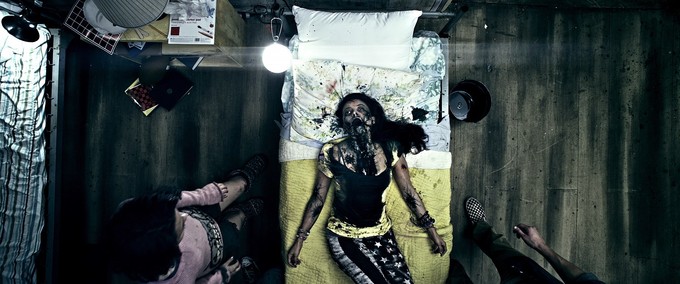
Quint: Yeah, it seems like an interesting alternative to just having one weekend in the big cities, especially since genre fans don't always live in New York or LA. I suppose VOD has helped those guys out, but it's a very different experience.
David Yarovesky: It's totally different. When I was a kid and I dreamed of making movies, the dream was never “I dream of a day when everybody could sit at home and download my movie on their TV.” I dreamed of making a big movie to be seen on a big screen for an audience that could watch it together and be scared together or laugh together.
It's such a big win for such a little movie, to come out and actually get a release like that. It's almost unheard of nowadays. I feel incredibly lucky. I'm very thankful to Nerdist, the produders, the cast and everyone who got behind it and made this happen.
Quint: I'm just saying, when it's a huge success and you're off making Captain America 17 you have to keep using my quotes on your trailers because I'm obviously good luck.
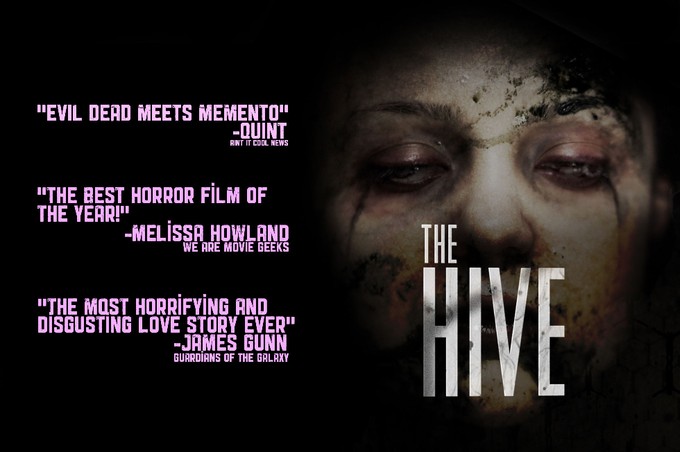
David Yarovesky: I think we should make that a tradition. The truth is, to me it already is a huge success because we've already done the impossible. We made a movie for nothing, and not like these stories you hear of films made for “nothing” getting good releases. No, we made it for nothing and we're getting seen and getting out there and people are talking about it. That's all I could have ever dreamed for.
Quint: And you're not kidding when you said you were going for a very cinematic style. I just saw The Visit and it's interesting to me to see M. Night Shyamalan retreat away from that look and more towards a non-cinematic documentary style while indie films without those same resources are trying to push more in that direction.
David Yarovesky: I haven't seen The Visit yet, but I feel like M. Night has always been a visual filmmaker, so I'm surprised to hear that it's not as cinematic. That seems to be the trend now, to make these horror films feel more real and less cinematic. I just didn't sign up for that.
Quint: I think that style might be losing some steam. I mean, look at The Conjuring, which is a very old fashioned scary ghost story told in a cinematic way and it made all the money in the world while many of these found footage style movies, while super cheap to make, aren't really catching on in a larger sense. Maybe audiences are responding to a movie telling them a story with real characters in a way that's not just some teenager with a cell phone camera.
David Yarovesky: Yeah, I love that The Conjuring did so well. But even then, movies like The Conjuring are revamping that low contrast '70s style film aesthetic. That's another contemporary genre tend that I'm also not on board with. We're pretty high contrast on The Hive!
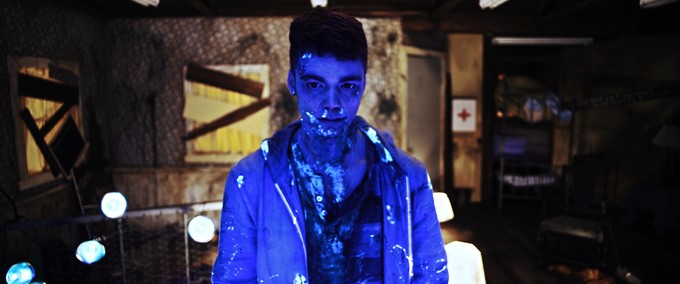
Quint: Hey, you're a music video director. You have to throw crazy modern filmmaking styles in there.
David Yarovesky: If you were a fly on the wall on the set, what you would have heard me say about a thousand times is that I don't want to fall into the trap of being branded as just another music video director that couldn't work with actors or tell a story. If you talk to the actors, I was all about working with them and pulling out the best performance possible and getting some real moments with them. I think we did that.
Quint: Listen, making a low budget movie forces you to use every trick you can to visually tell your story, but even if you nail that it's not going to matter if we don't give a shit about the people we're watching on the screen. That's true of almost every movie, but it's even more crucial on something where your resources are so limited. The audience has to connect to somebody.
David Yarovesky: From day one the most important thing was that this movie was good. We didn't go out there and chase the biggest names, we cast the people who were the best actors. We auditioned them and they were the best actors that came out who channeled the character the best. For investors and producers that's a gamble, but we just made a commitment that at the end of the day the movie has to be good because there's no marketing angle besides “this movie is awesome!” We were hellbent on making it awesome in every way we possibly could where money was a giant factor preventing it.
Quint: Well, I think you pulled it off. Is there anything you want to throw in here at the end?
David Yarovesky: I'd just encourage everyone reading that if this is something that interests them, if it excites them then please buy a ticket and come out Monday night, September 14th. I'll be watching the movie in Los Angeles, but we'll all be watching it at the same time together across the country. I hope everyone comes out and checks it out.
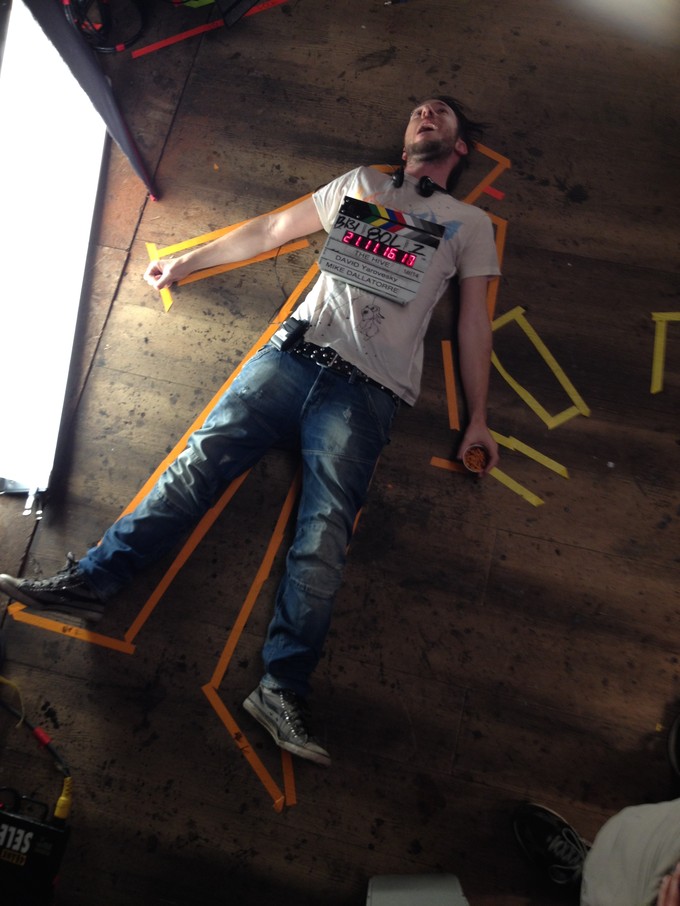
There you have it. Once again, check out Fathom Events to pick up your tickets and if you dig the film spread the word. I think the cool kids are using #nerdisthive to get all the social media folks talking about this cool little flick.
I'm going to leave you with the trailer to get you super pumped and excited to watch this thing:
-Eric Vespe
”Quint”
quint@aintitcool.com
Follow Me On Twitter

